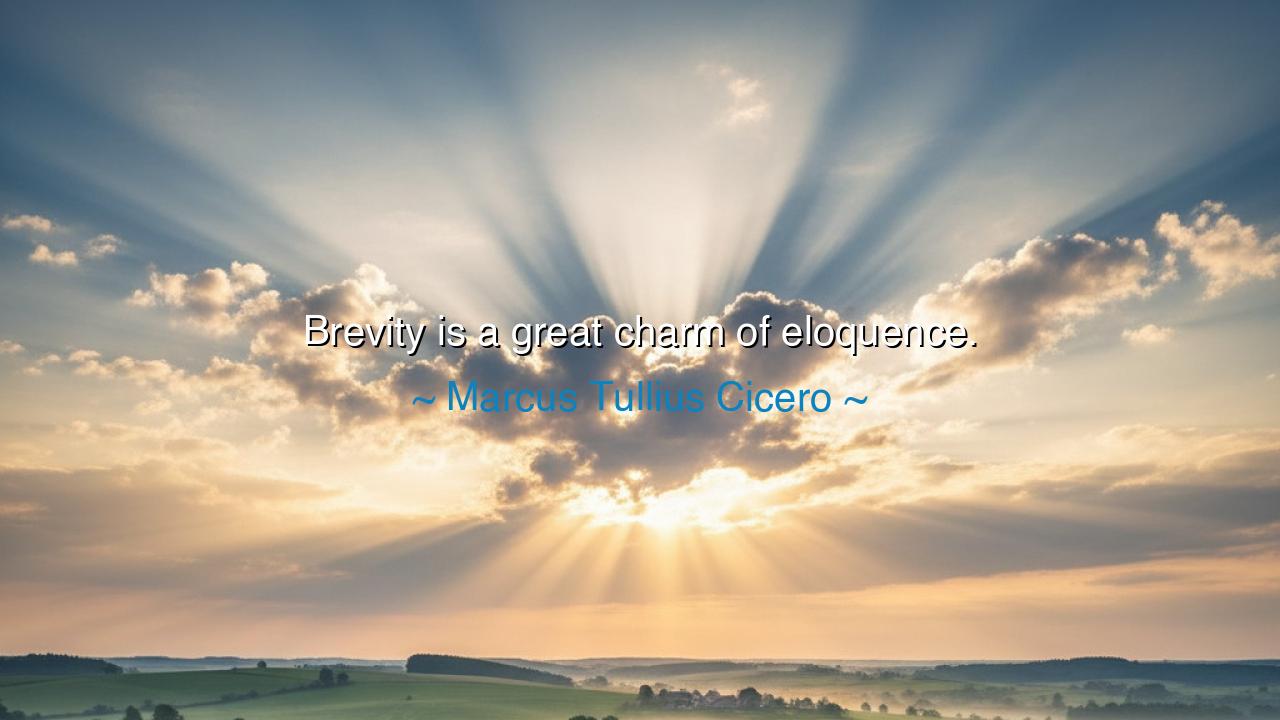
Brevity is a great charm of eloquence.






In this timeless declaration, Marcus Tullius Cicero, the great Roman orator and philosopher, reveals one of the most profound secrets of speech and wisdom: “Brevity is a great charm of eloquence.” These words, though few, carry the very essence of the truth they proclaim. Cicero, who mastered the art of persuasion, understood that true power in speech does not lie in the abundance of words, but in their precision, clarity, and grace. Like a sculptor who carves away the excess stone to reveal beauty within, the eloquent speaker must remove all that is needless, leaving only what strikes directly at the heart.
The meaning of this quote lies in its reverence for restraint — the understanding that the mightiest words are those sharpened by thought and purified by simplicity. Cicero teaches that language, when excessive, loses its force; that verbosity clouds truth rather than revealing it. A single phrase, spoken with clarity and conviction, can move the hearts of men more deeply than long-winded speeches filled with noise and vanity. Brevity is not mere silence — it is disciplined speech, the art of saying much with little, of giving meaning room to breathe. In the realm of eloquence, brevity is not limitation, but liberation.
The origin of this wisdom comes from Cicero’s own life and work as Rome’s greatest orator. He lived in an age when speech was both weapon and art — where words could sway the Senate, defend the innocent, or kindle the flames of revolution. Yet Cicero knew that oratory was not only about grandeur and flourish; it was about timing, rhythm, and restraint. His speeches against Catiline and his defenses in the courts of Rome were filled not with excess, but with precision — each word weighted, each pause deliberate. It was this balance that made him not just persuasive, but immortal. His brevity gave his speech the beauty of a sword — sharp, exact, and deadly when wielded with purpose.
Throughout history, this principle has proven eternal. Consider Abraham Lincoln, whose Gettysburg Address, only 272 words long, endures as one of the most powerful speeches ever delivered. In those few sentences, he consecrated the sacrifice of soldiers, defined the meaning of liberty, and gave a vision of national rebirth. The crowd that day had already listened to a two-hour oration by another speaker — a torrent of words soon forgotten. But Lincoln’s brief and solemn address still echoes through the centuries. His power came from brevity, from the courage to speak only what mattered, and to let silence carry the rest.
This virtue of brevity is not only for orators but for all who wish to communicate truth and wisdom. The teacher who can explain with clarity, the writer who can move hearts in few words, the leader who speaks concisely in moments of crisis — all practice this ancient art. To be brief is to respect both one’s listener and one’s message. It requires discipline of thought and humility of ego. For the verbose seek to impress; the brief seek to enlighten. Brevity, then, is not the absence of thought, but its distillation into pure essence.
And yet, brevity alone is not enough. Cicero does not praise cold efficiency or clipped speech; he speaks of brevity as a charm — a beauty that arises when clarity meets emotion, when wisdom meets grace. To be brief and eloquent, one must first understand deeply. Words gain their charm when they arise from conviction, when they are born of truth. In this way, the art of brevity is also the art of the soul — it teaches patience, humility, and respect for the power of the spoken word.
The lesson of Cicero’s teaching is clear: Speak less, but say more. Before you speak, think — what must be said? What will endure? Do not waste breath on vanity or excess, but let every word serve a purpose. Whether in writing, in leadership, or in conversation, seek not to fill silence, but to honor it. Learn to wield words like a craftsman uses tools — carefully, skillfully, and only as needed. For brevity, when joined with sincerity, becomes a force more powerful than any storm of speech. It is the mark of the wise, the music of the eloquent, and the greatest charm of all communication.
Therefore, remember, my child: when your words are few, let them be true; when your speech is brief, let it be beautiful. For language is not measured by length, but by light — and those who master the art of brevity speak with the timeless voice of wisdom itself.






AAdministratorAdministrator
Welcome, honored guests. Please leave a comment, we will respond soon